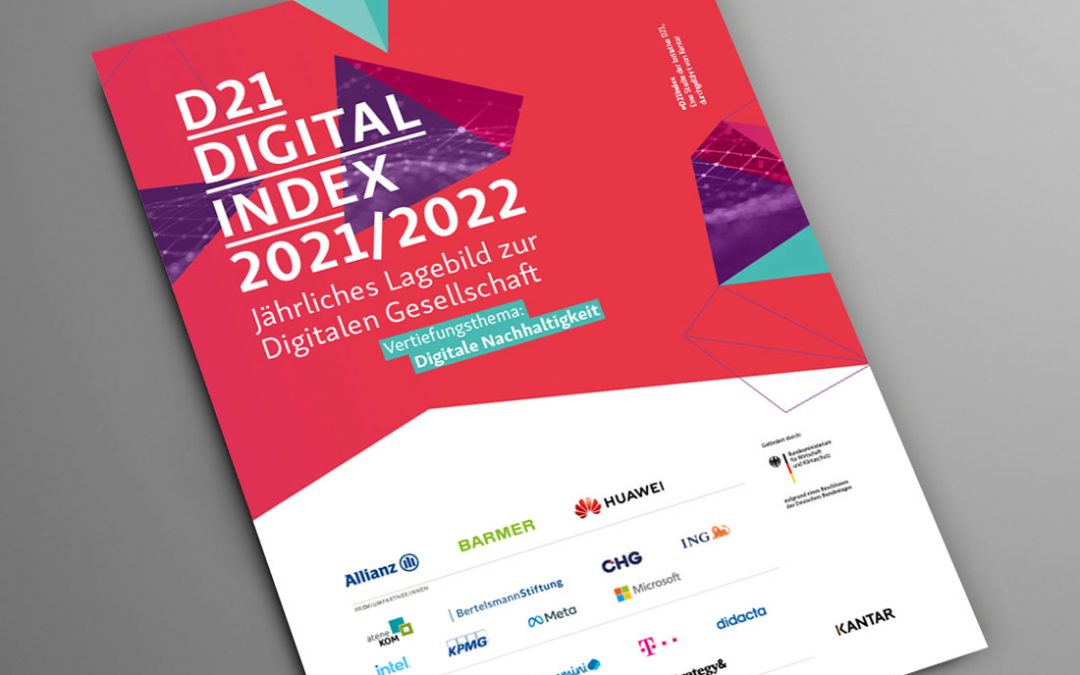The level of digitalization in German society also increased last year. This is the key finding of the new Digital Index published by Initiative D21: according to the index, over 90 percent of all people in Germany use the internet. For eight out of ten, the use of social media has become the norm. And almost a third of all employees worked from home during the coronavirus crisis. However, the study, supported by atene KOM as a partner, also shows that not everyone benefits equally from digitalization and that the development of digital skills urgently needs to be strengthened so that Germany remains competitive as a scientific society.
Since 2013, the Digital Index of the D21 initiative has been accompanying people through the digital transformation and shows how society is coping with the constantly changing and growing demands of digitalization. The D21 Digital Index summarizes the study results with a key figure for the degree of digitalization: It currently stands at 63 out of 100 points, three points more than in the previous year. Generations X, Y and Z have an above-average level of digitalization with 70, 72 and 75 index points, as do professionals of all ages with an average of 71 points. The level of digitalization is particularly high among office workers with an average of 78 points.
Majority meets digitalization with openness
More than half of people in Germany see an individual benefit in digitalization and believe they will benefit from it personally. For Tim Brauckmüller, Managing Director of aconium GmbH and long-standing partner of the initiative, this is a significant development: “Digitalization is no longer uncharted territory. The D21 Digital Index shows this very clearly. People are very open to digital change in their everyday lives. This is a very important finding, because we can only take full advantage of digital opportunities if we are prepared to use them. The vast majority are already doing so – because they believe they can benefit from digitalization. More digital participation will allow this proportion to grow steadily.”
Focus on further education and training
As digitalization increases, so does the need for digital skills. This is reflected in the increased awareness of the need for digital skills in professional life: according to the D21 Digital Index, 79% of citizens agree with the statement that “without basic knowledge of digitalization, there are hardly any opportunities on the job market”. At the same time, only 34% believe that schools teach sufficient digital skills to keep up with the international competition. Overall, more than one in four (27%) feel under constant pressure to keep up with developments in digitalization. Those in employment are significantly more likely to agree with this than those not in employment (31% to 20%), while part-time employees are even more likely at 35%.
When it comes to acquiring skills, further and advanced training clearly lags behind informal learning. Only 16% receive paid training and further education from employers, while 17% take advantage of free offers. In contrast, 69% teach themselves new skills through trial and error, while 65% seek help from family, friends or colleagues. Hannes Schwaderer, President of Initiative D21, says: “If we don’t invest massively in the digital skills of our citizens today, we will no longer be competitive as a knowledge society tomorrow. In Germany, we need a systematic development of skills that goes beyond training. To this end, the new federal government should take action as quickly as possible, formulate measurable goals, set up programs together with industry and educational institutions and review their effectiveness on an annual basis.”
Background
The D21 Digital Index is a social study that maps the level of digitalization in society. This annual status report has been published by the D21 initiative since 2013 and documents the digital transformation of German society. The degree of digitization of the population is examined on an empirical basis. It serves as a basis for decision-making for political, economic, civil society and scientific stakeholders.
As a network for the digital society, the D21 initiative is an association of around 200 member companies and institutions as well as stakeholders from politics, administration, business and science. aconium is a long-standing partner of the non-profit D21 association and supports the D21 Digital Index as a partner.
You can download the complete D21 Digital Index 2021/2022 here:
https://initiatived21.de/d21index21-22/

